Affiliate links on Android Authority may earn us a commission. Learn more.


Garmin Forerunner 265 review: Color me impressed
Published onMarch 21, 2023

Garmin Garmin Forerunner 265
What we like
What we don't like

Garmin Garmin Forerunner 265
The Garmin Forerunner 265 feels like a gym buddy who just invested in all-new workout clothing. Their kicks are fresh and their attitude is inspiring. On a fitness tracker, that translates to a beautiful new display and a few added training features. Internally, the things we loved about our old companion — the Forerunner 255 — are largely the same or improved. Garmin simply gave us exactly what we asked for: a reliable, lightweight running watch with an AMOLED display. Find out more in our Garmin Forerunner 265 review.
What you need to know about the Garmin Forerunner 265
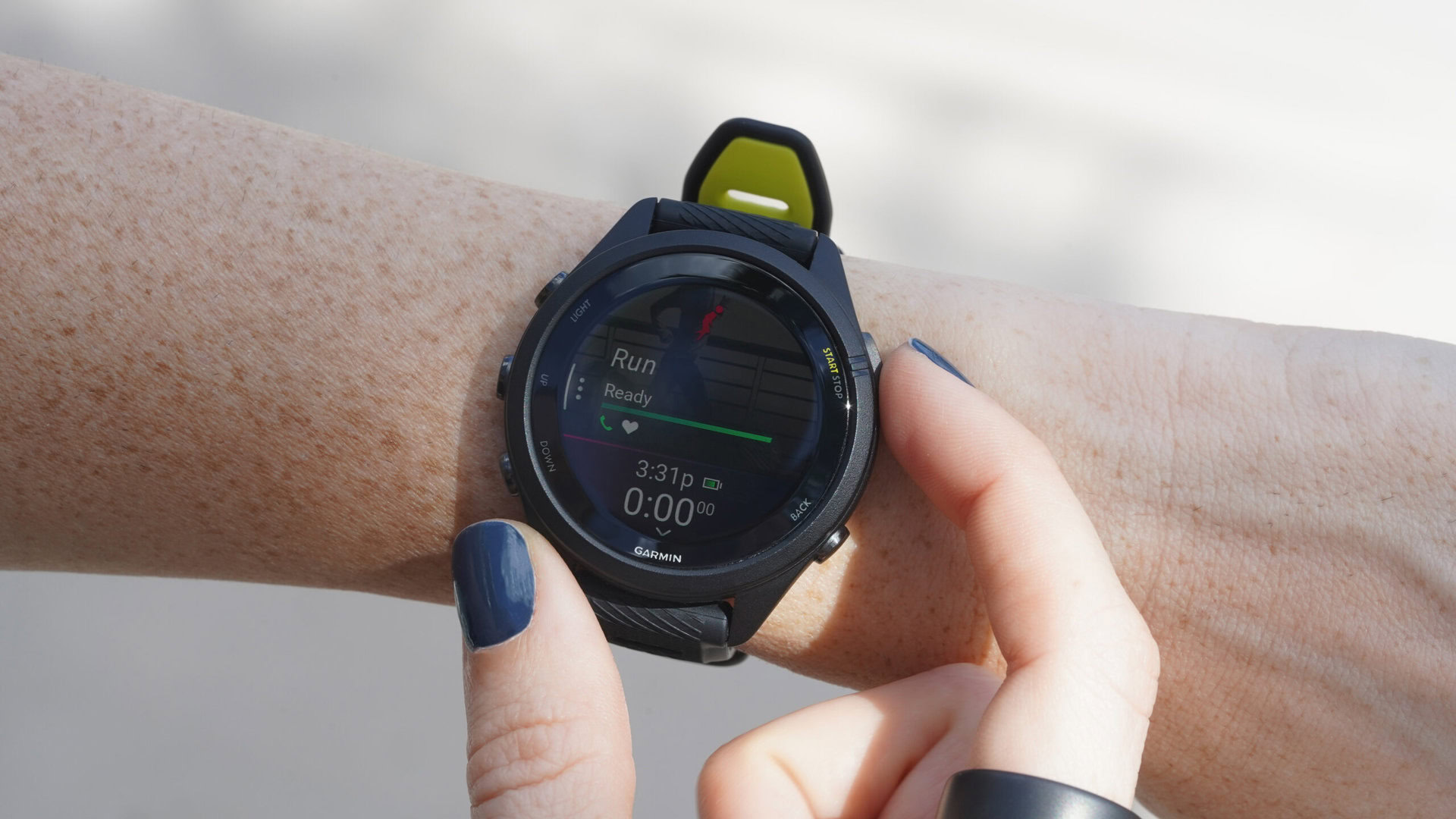
- Garmin Forerunner 265: $449 / €429 / £499
- Garmin Forerunner 265S: $449 / €429 / £499
The Forerunner 265 series launched on March 2, 2023, with a brand-new look. For the first time, Garmin dropped colorful, AMOLED touchscreen displays into the Forerunner family. Though it arrived alongside a new Forerunner 965, the 265 series represents Garmin’s mid-level entry point into the popular running watch lineup.
Like 2022’s Forerunner 255, the 265 series includes two sizes, a Forerunner 265, measuring 46mm with a 1.3-inch display and 416 x 416 resolution, and a Forerunner 265S, measuring just 42mm with a 1.1-inch display and 360 x 360 resolution. Both feature Gorilla Glass 3 for hardy durability, fiber-reinforced polymer bezels, and 5ATM water resistance ratings.
There is also no longer a distinct Music version, as both sizes offer 8GB storage with plenty of room for your favorite playlists. Granted, the base price is $50 more expensive than the Forerunner 255’s music model, but it’s nice to see such a staple feature treated as such. There isn’t a speaker on the device though, so you will need to pair a set of Bluetooth earbuds or headphones.
The Forerunner 265's showstopping upgrade is naturally the AMOLED display, but there are also plenty of training features onboard to make this a powerful running companion.
On the training front, the new 265 series still offers reliable health and fitness sensors, as well as multi-band GNSS support with SatIQ technology, wrist-based Running-Power measurements, and Garmin’s Training Readiness tool, an extremely popular metric for dedicated athletes. In other words, the devices pack a number of the company’s top training features at a fraction of the price of Garmin’s top watches.
Sure, the mid-range lineup did receive a price bump, asking shoppers to hand over $449 for either model compared to the $349 price point of the Forerunner 255. However, as mentioned, all 265 models are now priced the same and offer identical feature sets. You can purchase a Forerunner 265 series device now from Garmin.com or from third-party retailers like Amazon.
The Forerunner 265S is available in three colorways: black bezel and case with a black/Amp Yellow band, black bezel and white case with a Whitestone/Neo Tropic band, or black bezel and light pink case with a light pink/Whitestone band. Likewise, the large model is also available in three colorways: black bezel and Whitestone case with a Whitestone/Tidal Blue band, black bezel and case with a black/Powder Gray band, or black bezel and aqua case with an Aqua/black band.
What’s good?
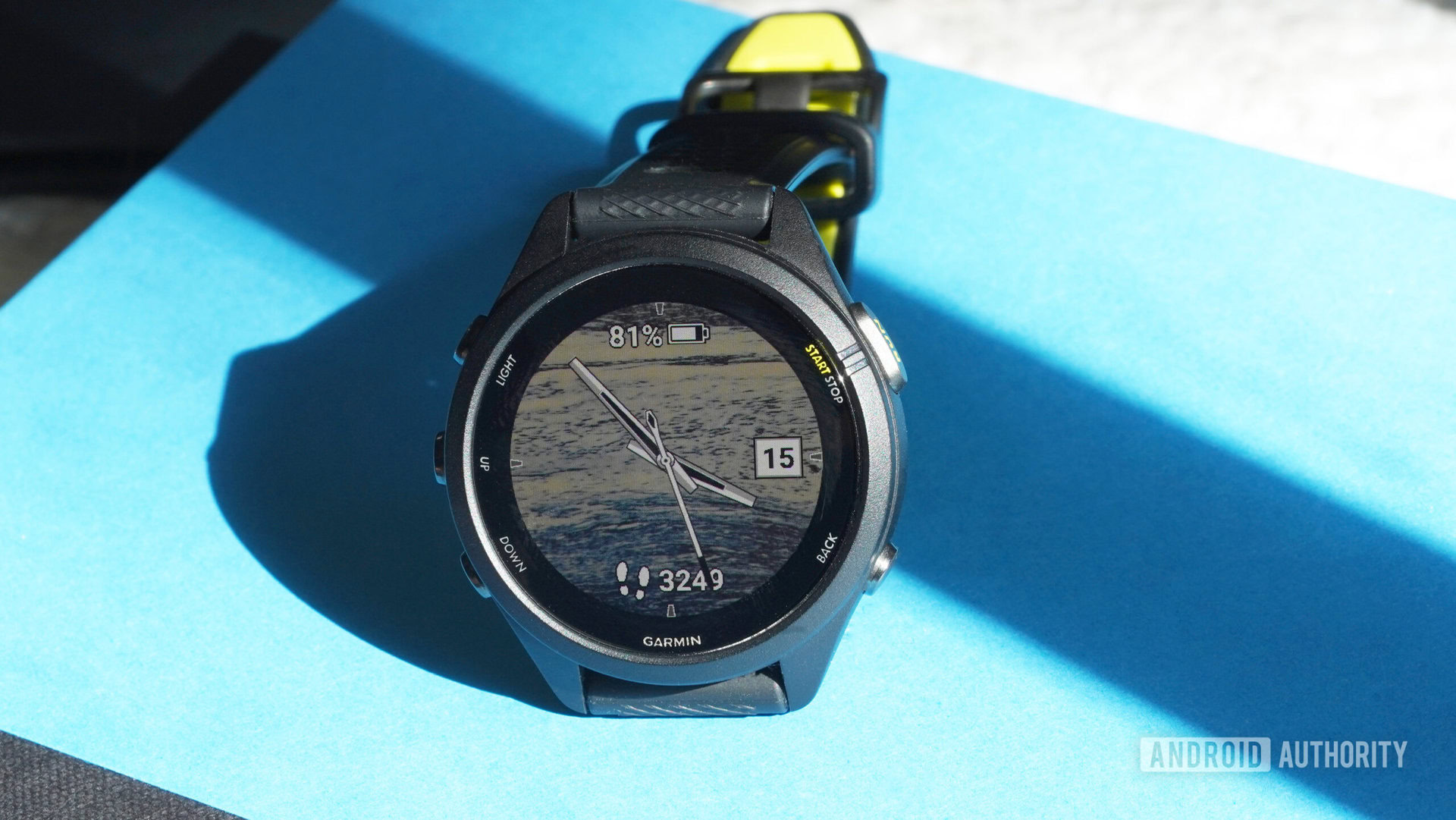
The design of the Garmin Forerunner 265 is as on-point as ever. I was thrilled to see a second size added with the Forerunner 255, and I’m even happier to see it return, now with music storage as standard. The build remains durable, lightweight, and highly adjustable. The band is a godsend, with tons of stretch for finding the perfect fit. The colors are bold and sporty without venturing into childish or garish. But while that’s all well and good, the most exciting design detail is the new AMOLED touchscreen display. This is a huge change for the Forerunner lineup and elevates the watch considerably. It’s much more reminiscent of a smartwatch now, with bold colors and crisp text.
Garmin returned with all the features we loved on the last Forerunner, plus a beautiful new AMOLED display.
As mentioned, the display sizes for the Forerunner 265S and 265 land at 1.1 and 1.3 inches, respectively. I tested the smaller model for this Forerunner 265 review, and found the display to be quite petite after spending so much time testing larger watches like the Apple Watch or Galaxy Watch 5 Pro. The display definitely could have benefited from smaller bezels, but it’s plenty readable, even mid-run with your heart racing and eyesight blurring. Even in obnoxiously bright sunlight, the watch is easy to see and, dare I say, attractive. Brightness settings are also adjustable for when you do venture back inside.
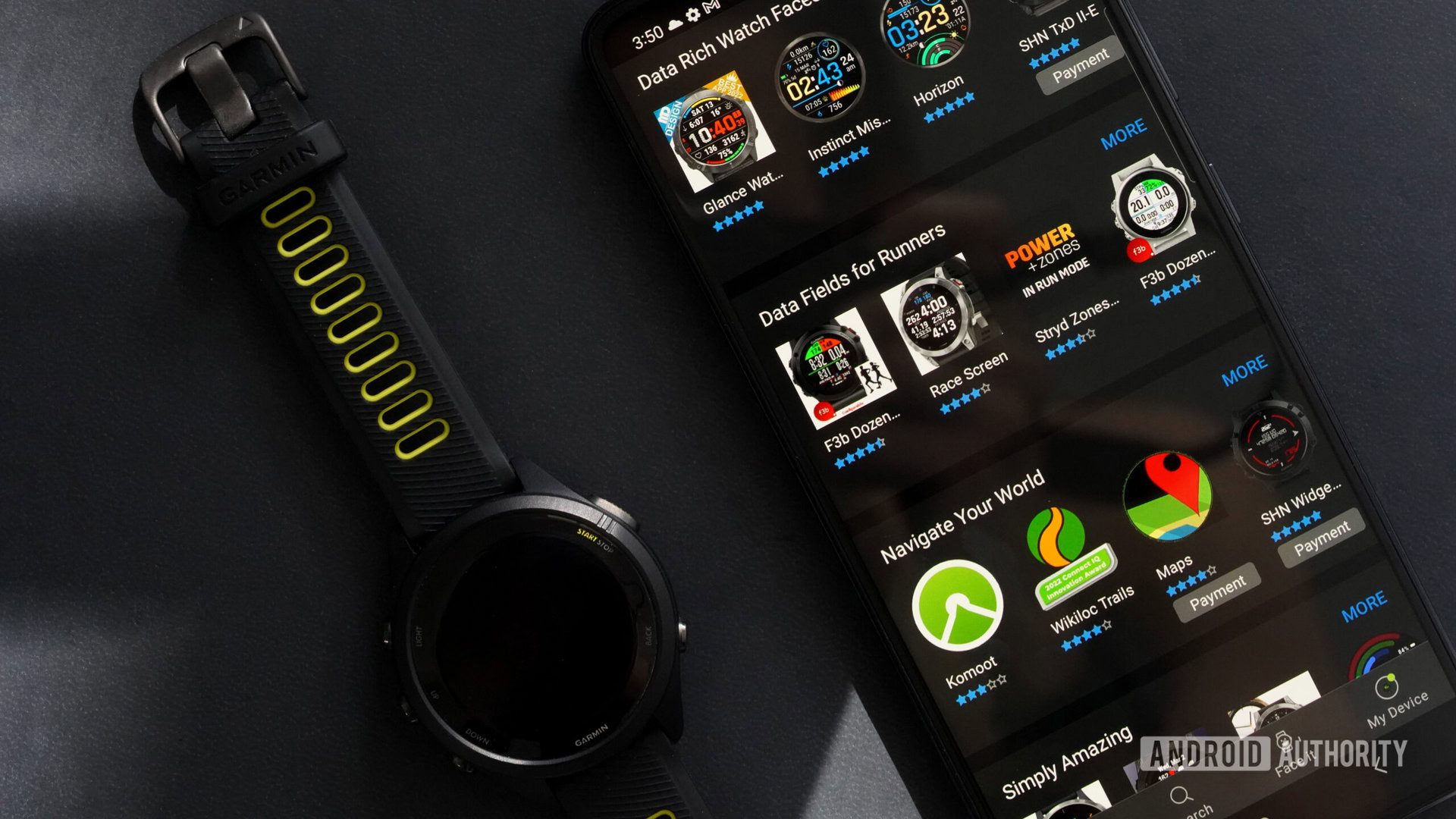
When you’re first swooning over the new display, you can scroll through the preloaded, customizable watch faces. These are all fairly similar, with complications you can swap out, varied color choices, and other details available to edit. Beyond the basic, the Garmin Connect IQ app stocks even more options with way more customization potential. I thought these options looked nice on the colorful display, even within the tighter real estate of the 265S. If you opt for the personal photos face, you’ll just want to pick subjects that aren’t particularly tiny. I tried a few abstract images of graffiti and wall murals, and they looked great (although somewhat loud for everyday wear).
You’ll find the same five-button interaction Garmin’s known to include, with navigation largely on the left side and start/stop and back buttons on the right. The top left button wakes your AMOLED display anytime you want to smile and sigh at your colorful new screen (or, you know, check important details). This top right button now says RUN, in case you forget what you’re supposed to do with the watch.
The Garmin Forerunner 265’s display is also now a touchscreen that you can use heavily or disable entirely depending on your preference. I found the screen plenty responsive even with wet hands but still relied on the buttons most often, especially during workouts.
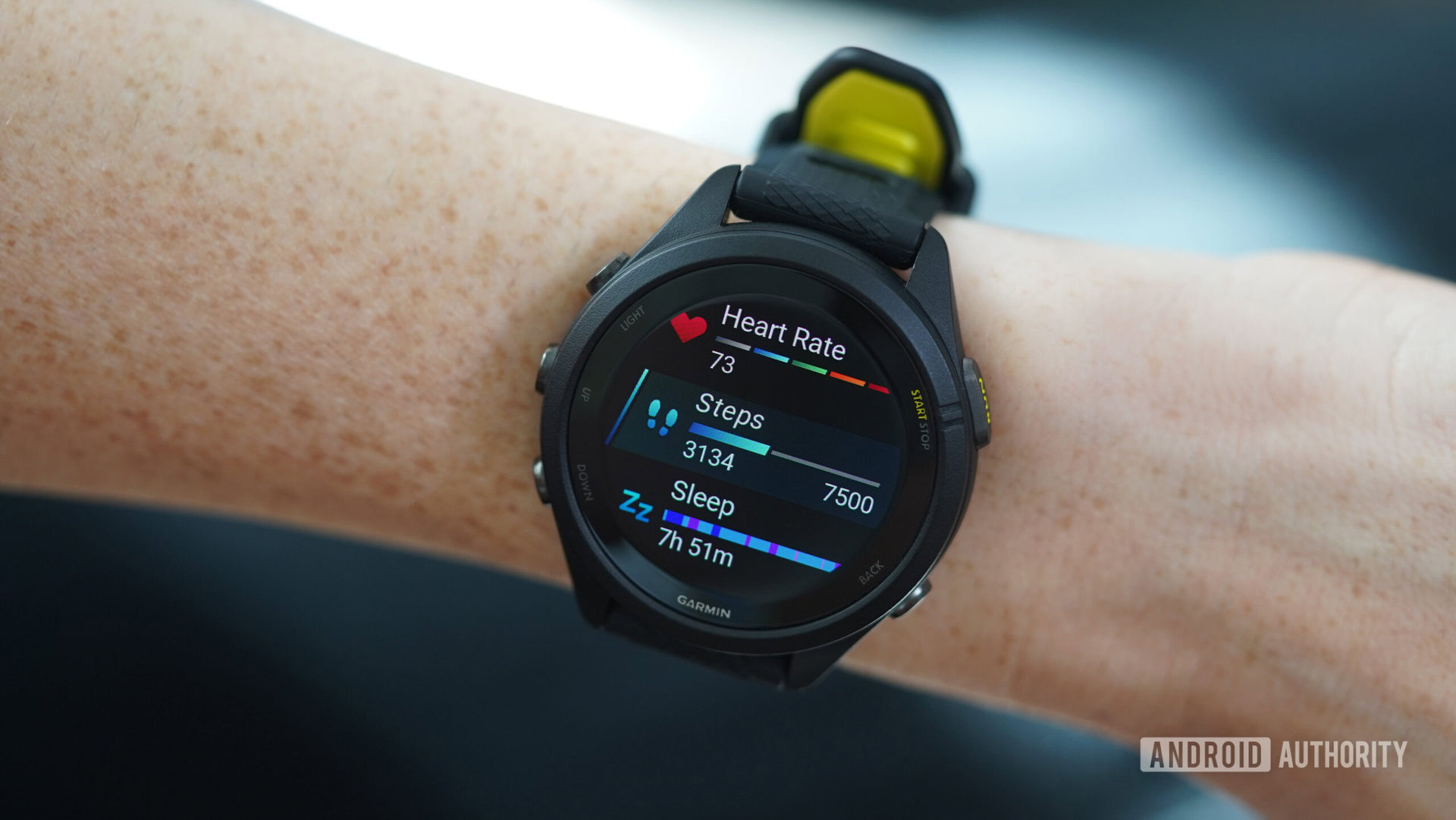
The smaller 265S model is technically 1mm larger than the smaller model of the previous generation. The watch case thickness also changed by .5mm, but I doubt most users will notice these differences. In general, I really liked the fit of the watch, especially when working out in cold conditions, because it easily slips under layers. The weight for the smaller model decreased by 2g down to 40g, but again, this change is too nominal to notice and I found the watch perfectly lightweight and comfortable. The larger model’s weight stayed the same as the Forerunner 255 at 46g.
As for battery life, in my testing, the Forerunner 265S model easily lasted a full four days in always-on smartwatch mode with daily multi-hour GPS workouts. Both models also support SatIQ to automatically switch between multi-band and low-power GPS as needed, which helps stretch battery life. Without always-on display, the watch kept pace to meet Garmin’s two-week claim. Charging the device from zero to 100% takes just over an hour, or about the duration of one episode of The Last of Us, plus a quick shower.
As I stated above, I found the smaller model plenty capable of displaying on-screen stats, notifications, and watch faces. Navigating the at-a-glance widgets and tapping in to see more data never felt cumbersome or undersized. I appreciated the customization available here as well to keep my personal priorities easily accessible. You can always hop over to the Garmin app if you prefer to dig into your data in greater detail on a larger screen.
Navigating the Forerunner 265 is simple via buttons or touchscreen, and the device offers tons of on-wrist data including Training Readiness.
The Forerunner 265 series also now offers Training Readiness, a metric not available in the previous generation. Training Readiness is a useful way to see how prepared you are for particular workouts, and it’s a powerful tool to access at this price point. You’ll also still get a Morning Report, Body Battery, and SpO2 monitoring.
In addition to all its native tools and features, you can pair the device with third-party sensors or broadcast to equipment like a Peloton. You can also still tap into suggested Garmin Coach workouts, monitor your stress, and track sleep. You can track your HRV Status, manage your Aerobic load, and make decisions based on your recovery stats. It’s also highly customizable. Each sport profile supports unlimited custom pages with six data fields per page. You can import GPX files and file routes or link up with apps like Strava to automatically sync your recorded data.
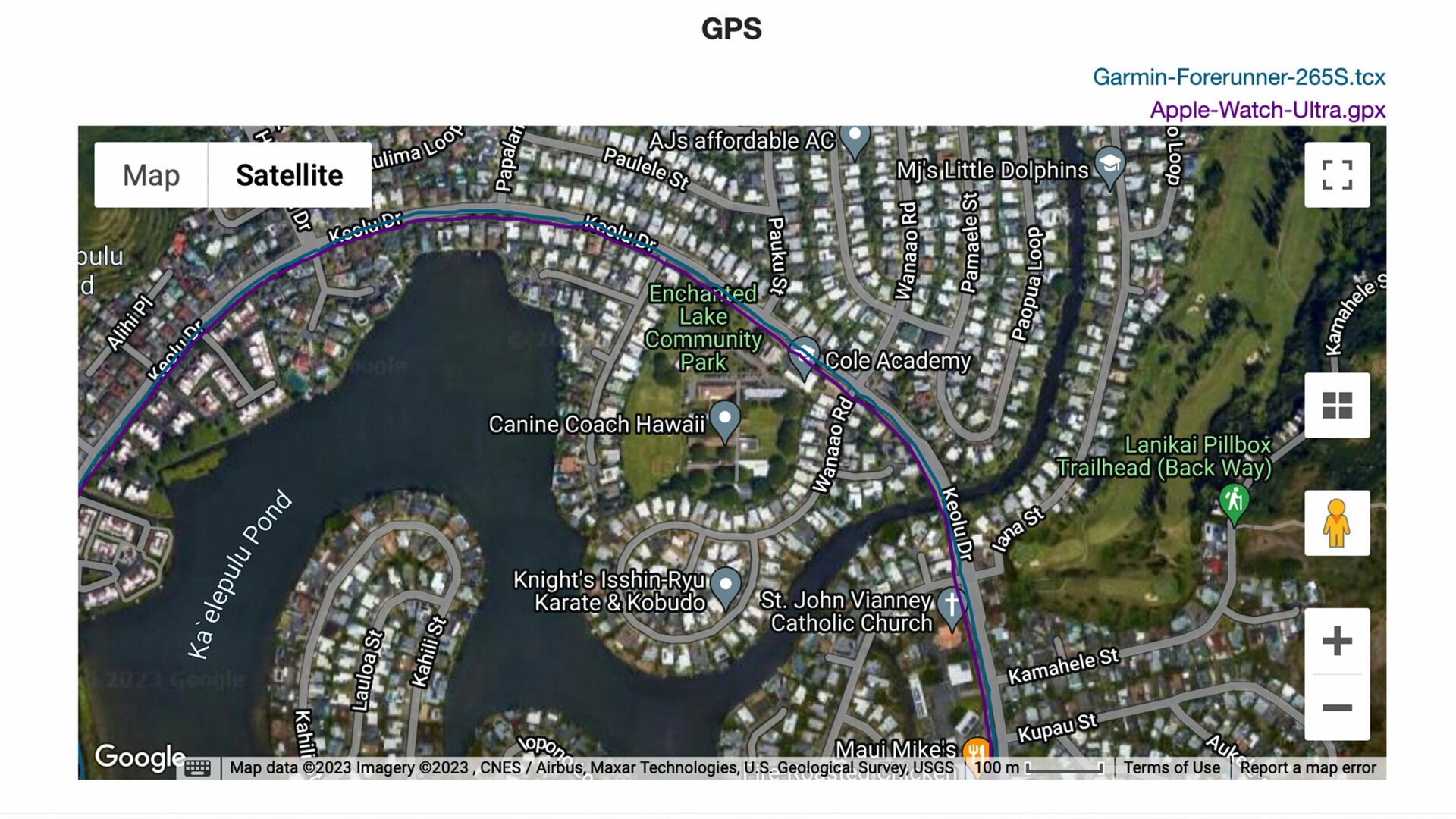
The GPS on the Forerunner 265 is fantastic. If, like me, you’ve come to expect accuracy from Garmin watches, the Forerunner 265 or 265S certainly won’t let you down. I wore the device on numerous neighborhood runs, bike trails, and even through city streets. My data consistently showed me on the correct side of the road despite cloud, tree, and building coverage. My total distances lined up nearly exactly with my Apple Watch Ultra and Garmin Fenix 7.
In fact, on the run depicted above, the Forerunner 265S I tested even kept pace with Apple’s top contender. Both devices nailed turns and kept me on the correct side of a busy drive. The Watch Ultra traced my path nearly exactly, showing my run on the sidewalk while the Forerunner occasionally inched into the road. As a dedicated running watch, the Forerunner 265 couldn’t deliver much better, and I was thrilled (though not surprised) to see Garmin’s more affordable device hold its own with pricier wearables. But GPS isn’t the only measurement that matters when it comes to training, so what about heart rate accuracy?
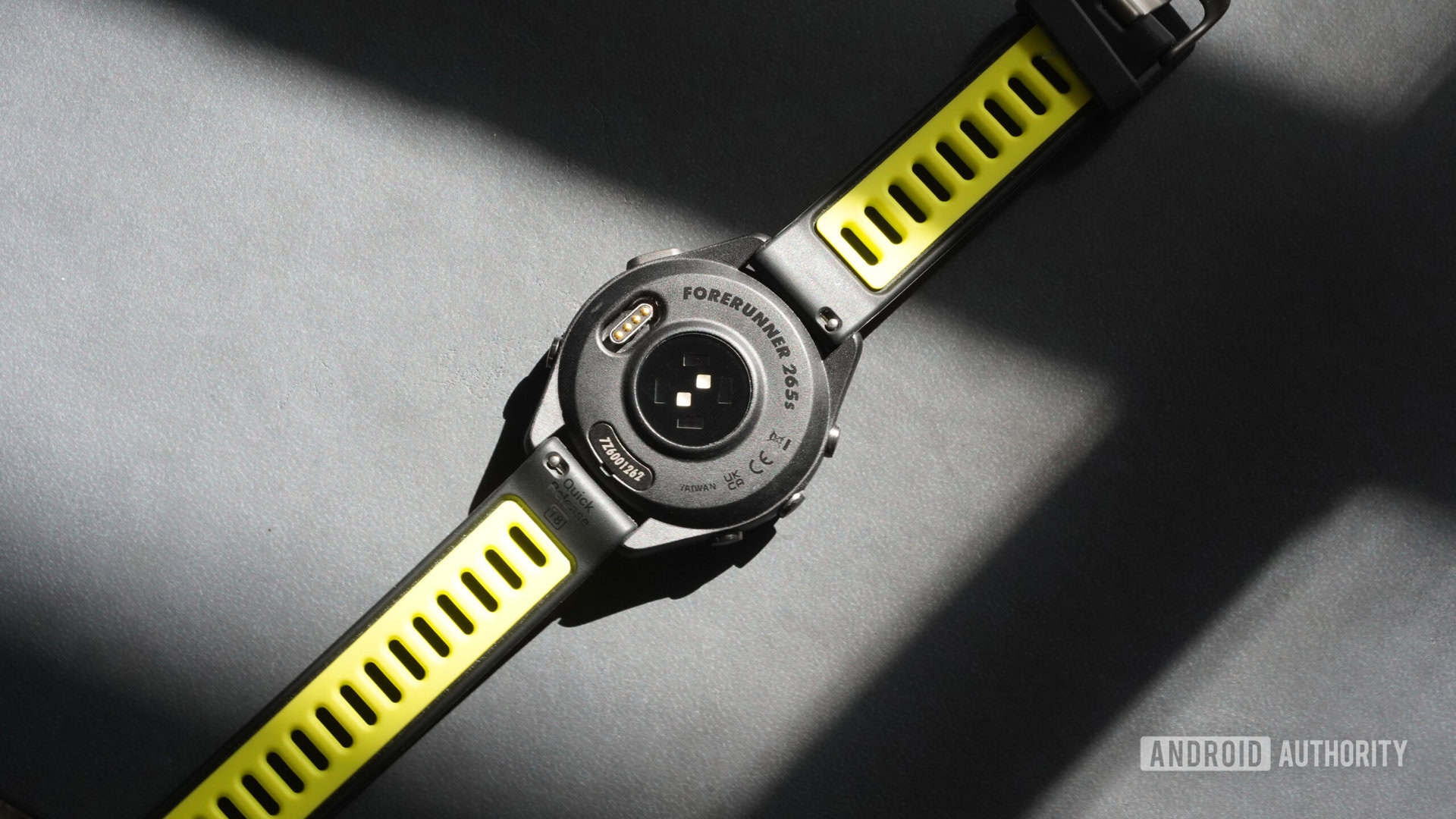
I wish I could build up more suspense, but simply put, Garmin’s Elevate heart rate sensor is simply fantastic as well. To be fair, sensor accuracy can be hindered by things like skin tone or fit. I was fortunate enough to collect highly accurate data, and I think that boils down to the sensor as well as the device’s design. For starters, the watch is very lightweight. It didn’t knock around on my wrist throughout workouts like some bulkier wearables, not even during exercises like jump roping or sprints. The band is also highly adjustable. As mentioned above, its stretchy material makes it easy to find a perfect balance between snug and comfortable.
The top-tier GPS accuracy of the Forerunner 265 is well-matched by Garmin's Elevate heart rate sensor providing athletes with great data.
I put the Forerunner 265S through interval runs, gym circuits, and one very intense pickleball match (or as intense a match as pickleball can get with a preteen). It kept up with my Polar H10 chest strap and some of the top wearables on the market. The only time I saw any skewed data was a very minimal delay at the start of sudden sprints on my indoor bike, but even those were negligible.
All of this to say, the Forerunner 265 is a powerful multisport watch at a reasonable price. It combines some of Garmin’s top training tools (including Training Readiness) with wildly accurate sensors to provide a reliable fitness companion. The freshly redesigned workout screen offers useful status icons including GPS and heart rate status. The post-workout screen offers intricate graphs, data sets, and health-focused details. There isn’t much not to like about the updates Garmin brought to one of its finest lines.
What’s not so good?
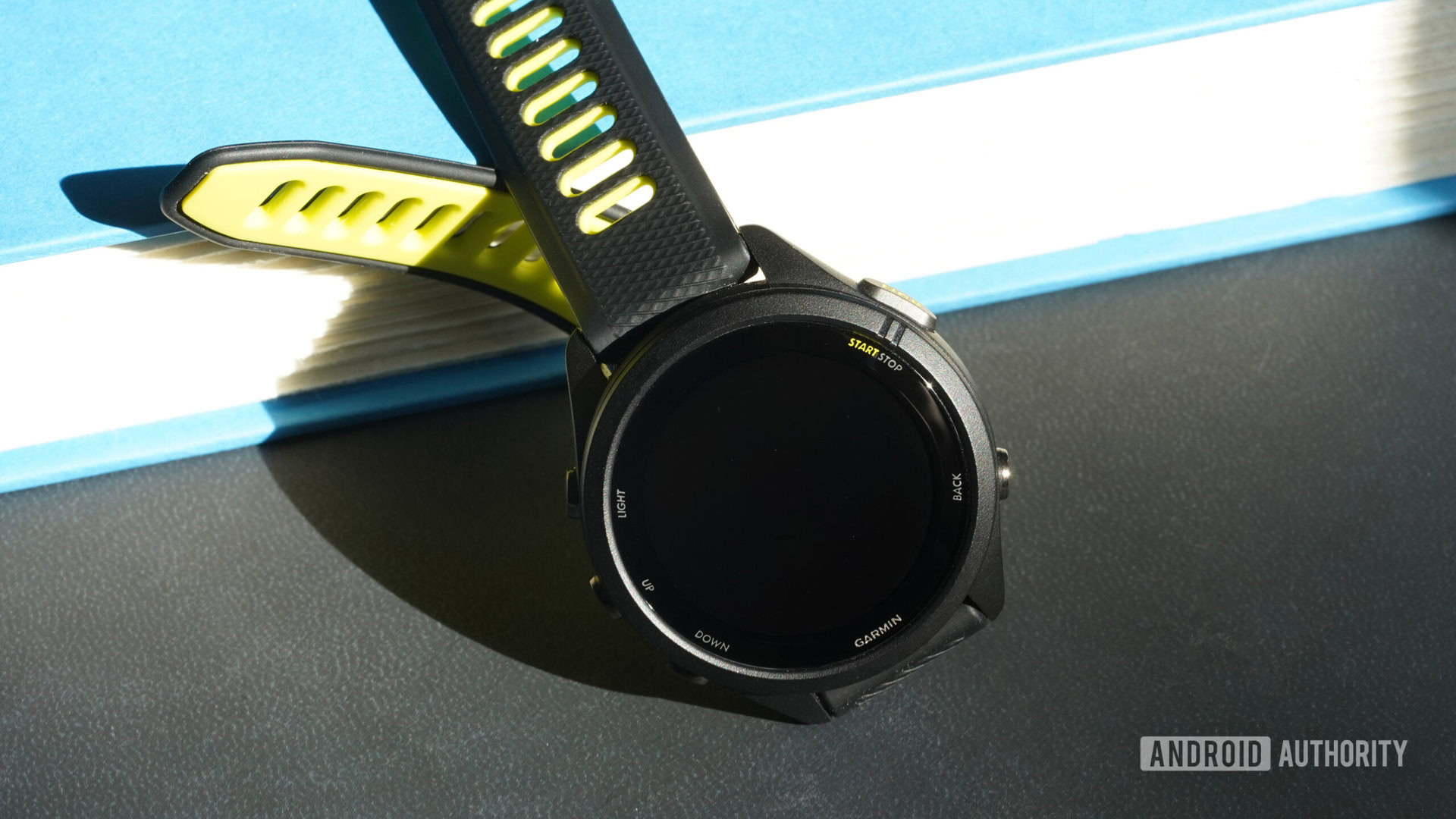
At the risk of sounding like a broken record, there isn’t much to complain about on Garmin’s latest mid-level Forerunner. The company has a knack for delivering the improvements users want to see on lineups that are already successful. I loved the Forerunner 245 and was further impressed by the added sensors and smart features of the Forerunner 255. With the 265, Garmin has kept me hooked on its mid-level lineup.
If I had to voice an overarching critique it would be that, aside from the AMOLED display, the new device is quite similar to its predecessor, and if you’re happy without the fancy screen, it’s almost definitely not worth an upgrade. Garmin watches also tend to pack way more than most users will ever need and this watch follows suit. If Training Readiness is something you’re likely to tap into, that’s a huge addition. If not, it’s another stat in a pile of stats.
That said, in our Forerunner 255 review we bemoaned the circus of buttons, and this time Garmin added a touchscreen. We also half-heartedly lamented a mediocre display; Garmin added the rainbow of an AMOLED one. In the hopes that Garmin keeps its ear to the ground, I’ve got some suggestions for the inevitable Forerunner 275.
It's hard to find much to complain about on the Forerunner 265 and 265S. I'll lodge a few broad complaints though because Garmin is famously good at listening!
Despite the inclusion of a neat touchscreen, smartwatch features on the Forerunner 265 remain limited, as does one of Garmin’s new health tools. If you were hoping to see the ECG app recently added to the Venu 2 Plus, then you’re in for a disappointment — that hasn’t made its way to this device. The Forerunner 265 doesn’t contain the necessary hardware for it to make a future appearance either. You also won’t find a microphone or speaker for on-wrist phone calls or for playing music from your wrist. You can store music and make purchases with Garmin Pay, but it’s still a fitness tracker first and foremost.
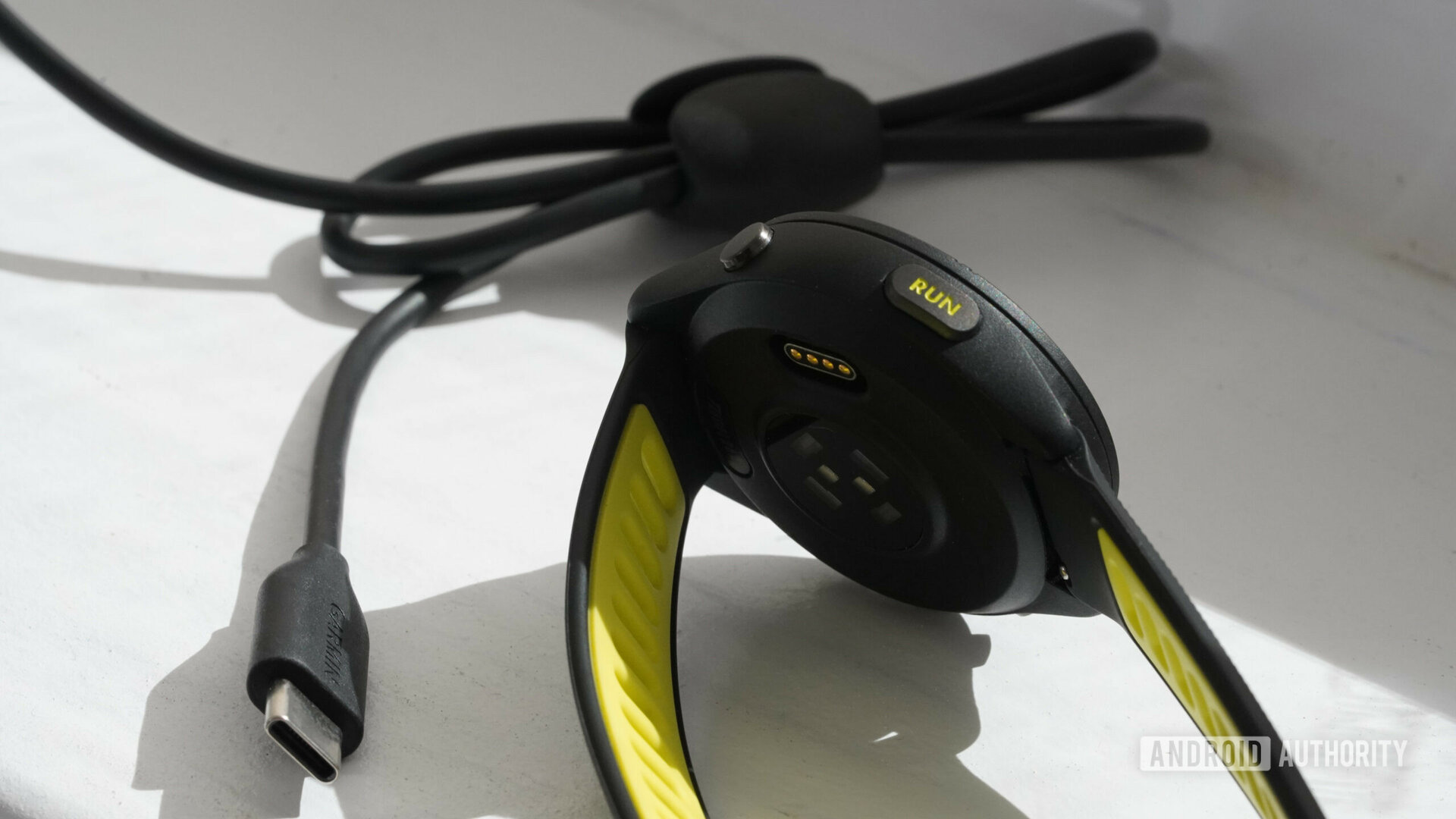
Arguably, the watch also doesn’t offer quite everything you might want in a running watch. For that, you’ll need to spring for the pricier Forerunner 965. For example, not all of Garmin’s mapping navigation features can be found onboard. This is probably fine if your training primarily occurs at home or in a familiar location. If you tend to travel or enjoy working out on vacation, it’s a factor worth considering.
In reality, these are all fair cuts to hit this mid-tier price tag. After all, the device is meant to be Garmin’s mid-tier offering. However, it did also jump in price considerably. This could be a reflection of the market in general or a result of the new display and added training features. However, it’s a large jump relative to its predecessor, and the Forerunner 255 series was already priced higher than the Forerunner 245. At some point, I’d love to see more consistent prices for this line rather than endlessly rising costs.
It also feels like a losing game to complain about proprietary charging on a wearable, but when a device has so few other issues, we’ll do it anyway. In addition to contributing less to e-waste, I just really want to purge my ever-multiplying cord basket. Garmin did give exactly half of the Forerunner 265 charger a makeover. The proprietary Garmin port is exactly the same as the previous model, but the power source end is now USB-C. Unfortunately, we don’t get the wireless charging Garmin launched recently with its Vivomove Trend.
Garmin Forerunner 265 specs
| Garmin Forerunner 265/265S | |
|---|---|
Display | 42mm 1.1-inch AMOLED, optional always-on 360 x 360 resolution 46mm 1.3-inch AMOLED, optional always-on 416 x 416 resolution |
Dimensions and weight | 42mm 41.7 x 41.7 x 12.9mm 40g Fits wrists 115-178mm 46mm 46.1 x 46.1 x 12.9mm 46g Fits wrists 135-205mm |
Colors and materials | 42mm Color: Black/Amp Yellow, Whitestone/Neo Tropic, or Light Pink/Powder Gray Material: Gorilla Glass 3 display, Fiber-reinforced polymer bezel, silicone strap 46mm Color: Whitestone/Tidal Blue, Black/Powder Gray, or Aqua/Black Material: Gorilla Glass 3 display, Fiber-reinforced polymer bezel, silicone strap |
Battery | 42mm Smartwatch mode: Up to 15 days GPS-Only GNSS mode: Up to 24 hours SatIQ GNSS mode: Up to 18 hours All-Systems GNSS mode + Multi-Band: Up to 15 hours GPS-Only GNSS mode with music: Up to 7.5 hours SatIQ GNSS mode with music: Up to 6.5 hours All-Systems GNSS mode + Multi-Band with music: Up to 6 hours 46mm Smartwatch mode: Up to 13 days GPS-Only GNSS mode: Up to 20 hours SatIQ GNSS mode: Up to 16 hours All-Systems GNSS mode + Multi-Band: Up to 14 hours GPS-Only GNSS mode with music: Up to 7 hours SatIQ GNSS mode with music: Up to 6.5 hours All-Systems GNSS mode + Multi-Band with music: Up to 6 hours |
Sensors | GPS GLONASS GALILEO Multi-Frequency Positioning SatIQ Technology Garmin Elevate Heart Rate Sensor Barometric Altimeter Compass Gyroscope Accelerometer Thermometer Ambient Light Sensor Pulse Ox Blood Oxygen Saturation Monitor |
Durability | 5ATM |
Connectivity | NFC Bluetooth Wi-Fi |
Compatibility | Android and iOS |
Garmin Forerunner 265 review: The verdict
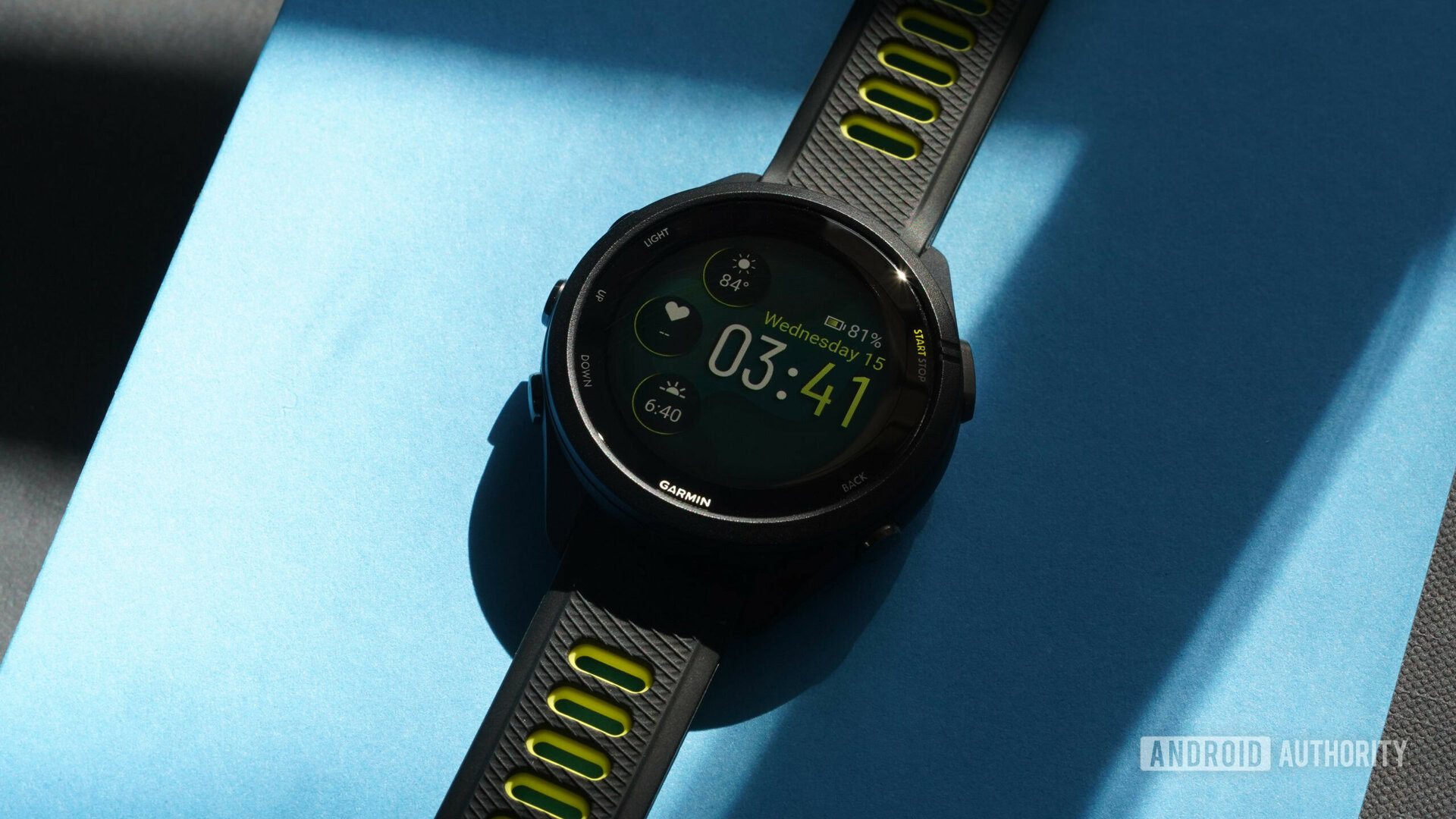
There’s a whole lot to like about the Garmin Forerunner 265, just like there was a whole lot to like about the Forerunner 255 ($304.99 at Amazon). Garmin’s advanced training and health features are nearly unmatched in the wearables space, and the Forerunner line is dressed to impress with colorful AMOLED displays. The new touchscreen elevates the Forerunner 265, in particular, to a more premium look and user experience.
On the other hand, that upgrade comes at a premium price. The watch launches at $100 higher than its predecessor. In other words, it’s a great purchase if you don’t currently have a reliable running watch. It’s attractive and boasts highly accurate sensors. However, if you already have a 255 strapped to your wrist, I personally wouldn’t recommend upgrading just for a pretty face. Most of the new model’s software updates will roll back to the older device anyway.
The Garmin Forerunner 265 offers an affordable entry point into a truly feature-packed line.
One exception is Training Readiness, which analyzes data like your sleep score, HRV, and more to maximize training efficiency. Some athletes might find the insights garnered through Training Readiness enough to justify upgrading to the 265. If you land in that camp, I highly recommend the smaller model for petite wrists.
If budget isn’t an issue and you’d like the absolute top-tier Forerunner, you’ll want to set your sights on the Forerunner 965 ($599.99 at Garmin). It also received an AMOLED facelift this year and packs even more training tools than its cheaper siblings. Conversely, if you just want the basics in terms of Garmin’s fitness suite but are itching for more smartwatch features, the Venu 2 Plus ($449 at Amazon) is the best smartwatch the company has produced yet.
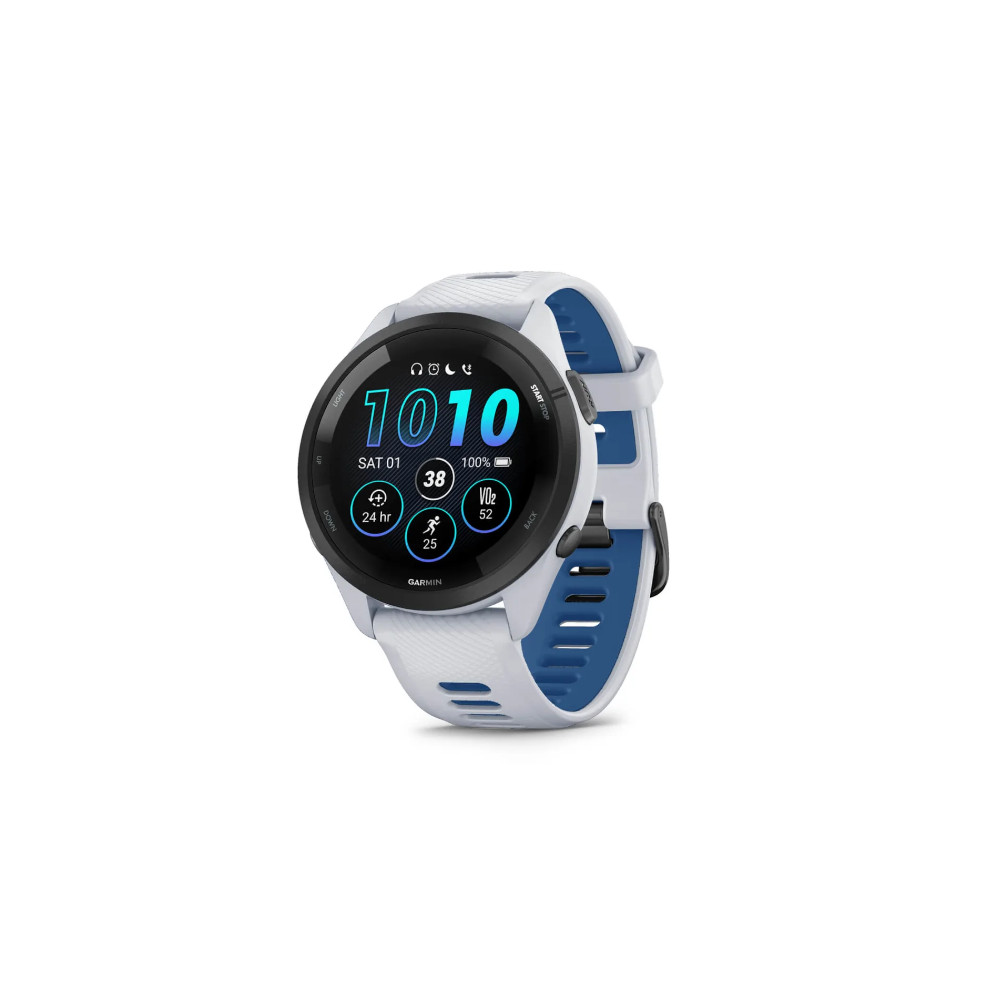

Top Garmin Forerunner 265 questions and answers
The Garmin Forerunner 265 has a 5ATM rating for water resistance.
Yes. The Garmin Forerunner 265 is compatible with both iPhones and Android phones.
You can send text responses on Garmin Forerunner 265 devices paired with Android phones only.
The Garmin Forerunner 265 and Forerunner 265S utilize 22mm and 18 quick-release straps respectively.